
VDA Annual Kick-off Press Conference
Strong location and competitiveness as major goals for 2023
At the press conference at the start of the year, association president Hildegard Müller calls for an ambitious program for better competitiveness and a strong industrial location. She presents concrete fields of action that are crucial for securing Germany's global relevance.
At the press conference at the start of the year, association president Hildegard Müller calls for an ambitious program for better competitiveness and a strong industrial location. She presents concrete fields of action that are crucial for securing Germany's global relevance.
At the big digital press conference at the start of the year, Hildegard Müller gave an outlook on the most important topics for the German (automotive) industry in 2023. The VDA President emphasized above all that Germany and Europe, as leading industrial locations, must be strengthened in order to ensure the transformation success. Furthermore, the market forecasts of the German automotive industry for the year 2023 were presented.
"Think economic and geopolitics more closely together"
The annual goals for 2023 for Germany as an industrial location cannot be set without looking at the past year: The pandemic, the Ukraine war, tense supply chains, the energy crisis and other global conflicts have accompanied us over the past year - and the people, economy and Industry face major challenges.
Those experiences also create awareness that our current economic model is no longer an automatic guarantee of prosperity. The geopolitical developments have also ruthlessly revealed the weaknesses of Germany as a business location: "While intense international competition for locations has begun, Germany is now - in addition to the ongoing crisis management - confronted with the fact that economic and geopolitics must from now on be even more strategically thought out and developed," summarized Hildegard Müller.

Ensuring international relevance
What mandate does this derive for Germany as an industrial location? The political and economic actors must press ahead with the transformation to climate neutrality with even more vigour. Furthermore, Hildegard Müller emphasized that Germany can only anchor more global responsibility, its values and climate protection positions internationally in the long term as a leading global economic nation.
She sees a key in a clear commitment from politics and society to the industry: "Without an ambitious program for competitiveness and location, we risk losing the connection globally - with negative consequences for prosperity, employment and climate protection."
One thing is clear: location and competitiveness must be the political priorities in 2023 in order to strengthen and secure the global relevance of Germany as an industrial location.
In her speech Hildegard Müller presented the following fields of action, which are decisive for this program:
1. Energy policy
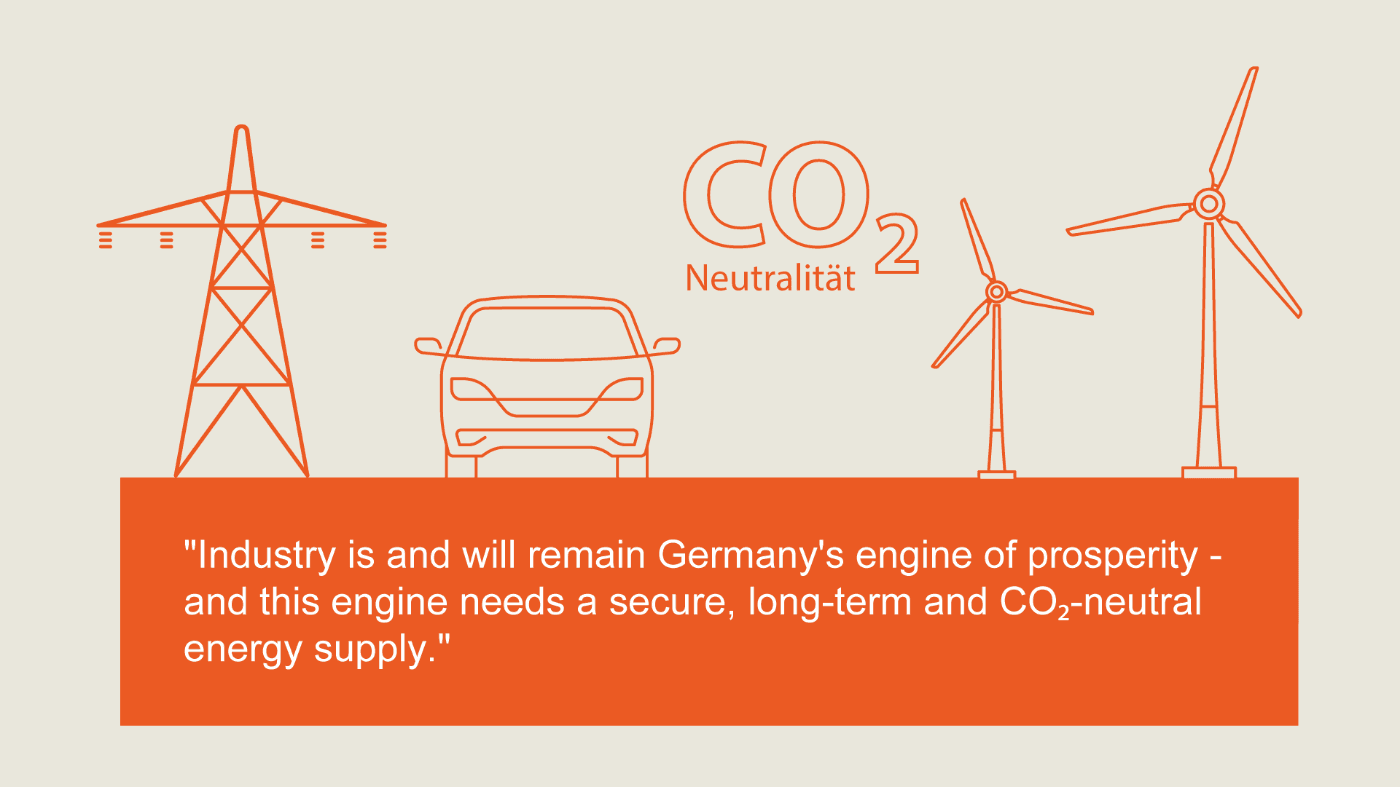
Industry needs energy - and at the same time CO₂-free and affordable. It is therefore important that politicians not only deal primarily with the acute effects of the energy crisis, but also ensure a strategic long-term supply.
Energy should be affordable and not a "luxury commodity" for people and industry - but achieving this will be even more challenging given the trend in electricity costs this year. It will be crucial that the demand will be covered with all available options and that short-term tax relief quickly leads to relaxation without red tape.
In this context, Hildegard Müller emphasized: "The more energy procurement and generation costs rise, the more the state must ensure that other costs and tax burdens are reduced."
Another point: access to energy has already become a key issue in international competition. That is why Berlin and Brussels should work together more consistently in future for international energy partnerships and conclude them.
2. Digital and analog infrastructure
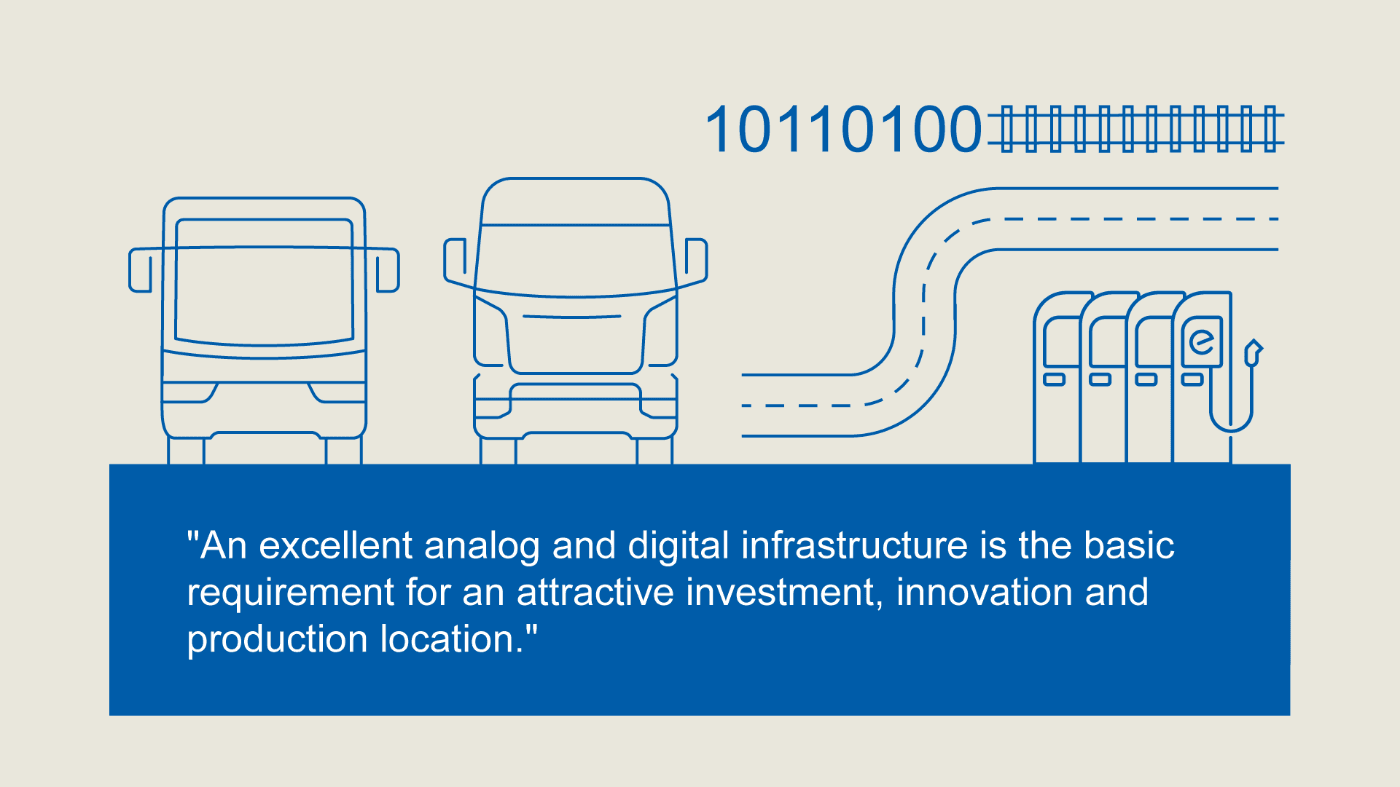
79% of companies in Germany currently feel that their business is being impaired by a poor infrastructure. This was the result of a survey by the German Economic Institute (IW). Blocked motorways, rail traffic failures and traffic jams in seaports make companies' activities more difficult. Therefore: The infrastructure in Germany must once again be of central importance, so that this former locational advantage can contribute to an efficient economy and the success of the transformation.
This becomes clear, for example, when e-mobility is ramped up: A reliable infrastructure of charging options makes up the base for people’s trust in the traffic turnaround. Charging must be possible at fair prices and with climate-neutral energy - but at the moment there is a wide gap between goals and reality.
Focus on digitization: Companies are also significantly affected by an inadequate communication network. More than two-thirds of the companies surveyed stated that some of their problems lie in the communications infrastructure. Conclusion: In order to be able to master the challenging economic goals, not only an excellent analog infrastructure is needed, but also an excellent digital infrastructure - and here the state's efficiency urgently needs to catch up.
3. More speed in bureaucratic processes
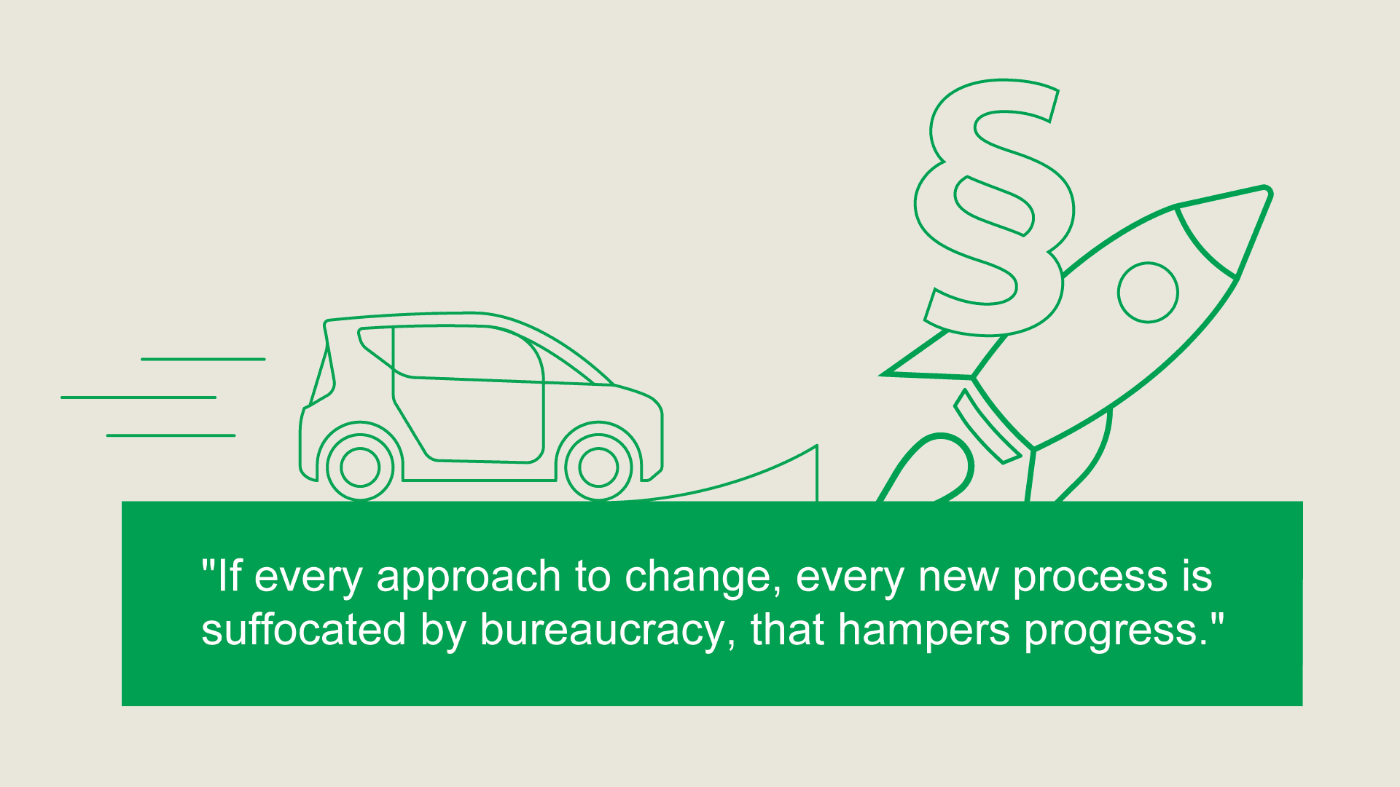
Slow and bureaucratic approval processes have become an increasing challenge for the industry - there is an urgent need for reform.
Small and medium-sized companies are particularly burdened by the complex approval procedures and reporting requirements, and this also applies to the automotive industry. For our industry, this means: The lengthy, complex processes have developed into a massive investment obstacle. And: there is a world of difference between operational reality and the federal government's claim to speed up planning and approval processes.
Our demand: In order for industry and medium-sized companies to be able to develop better, the German tax system and the approval procedures urgently need to be made more digital, simpler and faster.
4. Raw materials
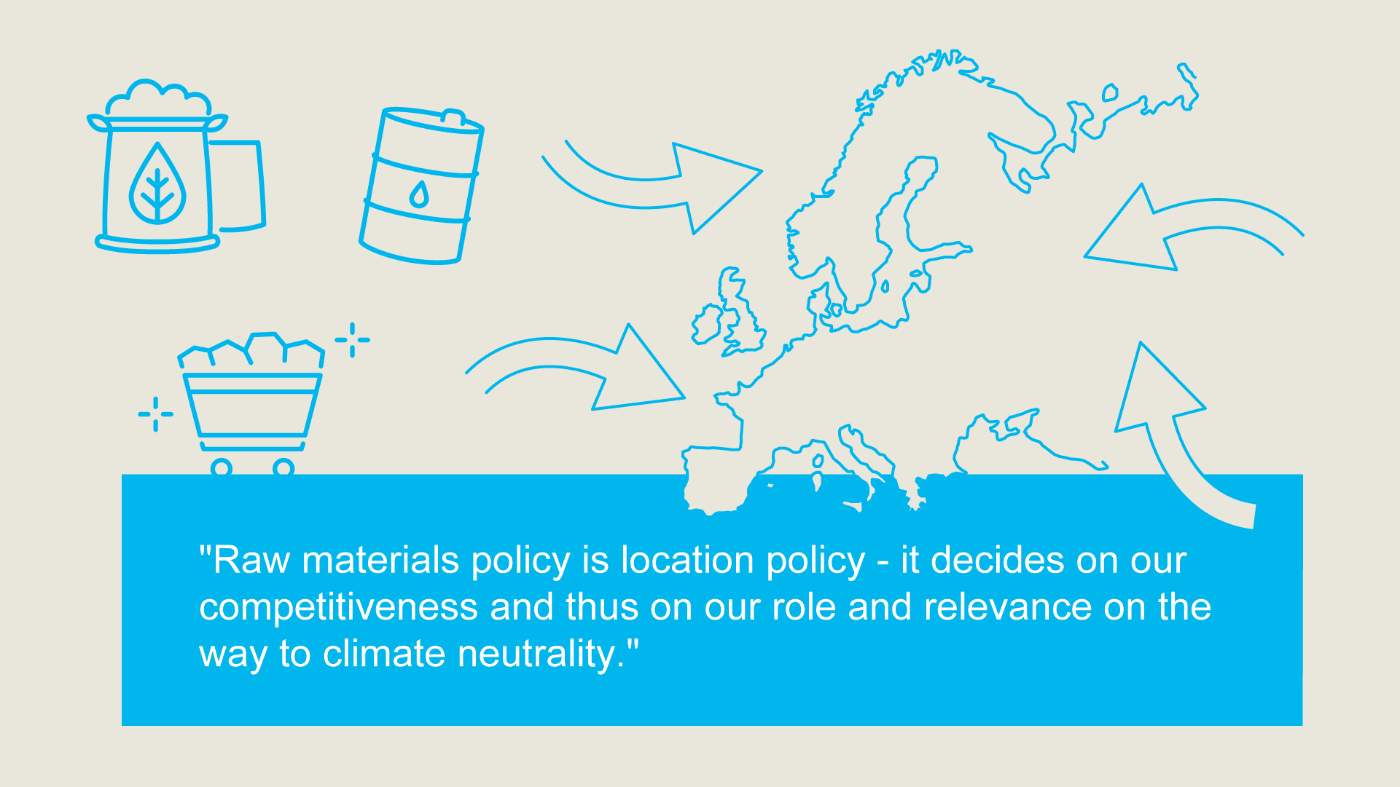
Today, raw materials are crucial for the global competitiveness of an industrial location - and specific raw materials make the transformation possible in the first place. The automotive industry has long been pursuing a consistent path towards alternative drives - in the passenger car sector, electromobility comes first.
For its successful ramp-up the availability of raw materials is crucial: batteries primarily need lithium, nickel, graphite and cobalt, while rare earths are required for the production of electric motors. According to all forecasts, this demand will increase enormously: for the battery raw materials mentioned, by at least four times, in some cases seven times. A new raw material base is therefore needed in order to carry out the industrial change towards climate protection.
Hildegard Müller's appeal to Berlin and Brussels: "Preventing raw material shortages is not only a geological challenge - it is above all an economic policy requirement. This central insight must result in more political speed: Europe now needs an agency for strategic raw materials." Conclusion: The industry is ready for corresponding entrepreneurial initiatives and projects, now it’s the turn of politics!
5. International trade agreements
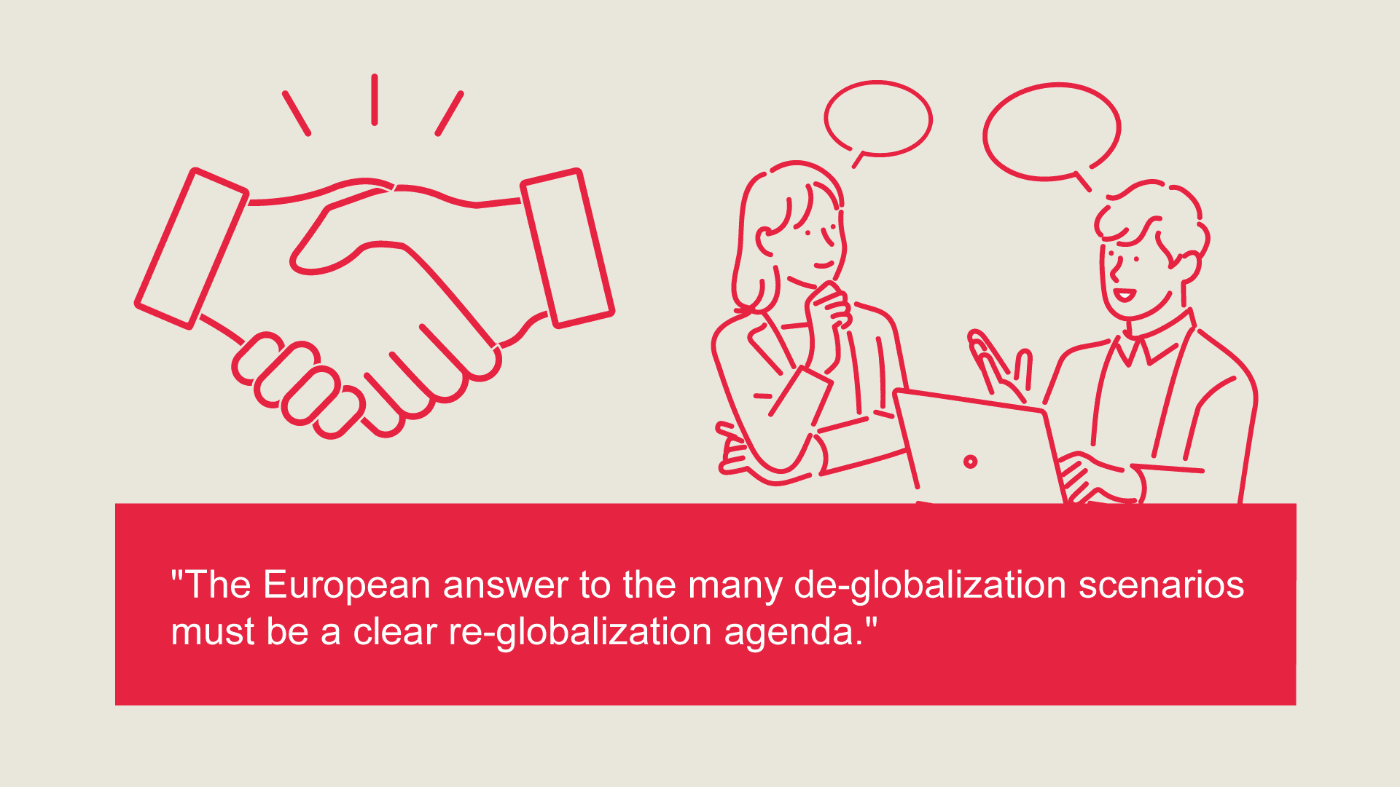
As already mentioned in the above points, a paradigm shift is needed to give Germany new options on the global raw materials market as an industrial location.
Hildegard Müller called on Berlin and Brussels to act together on the issue of energy and raw material supply, to secure it with partnerships and to guarantee internationally competitive prices: "The European answer to the many de-globalization scenarios must be a clear re-globalization agenda. This agenda is founded on a much broader basis – with commodity and trade agreements as well as with energy partnerships."
Further advantages of this cooperation: They form the supporting pillars for a crisis-proof, robust and successful transformation of the economy. In addition, they help Germany to reduce dependencies and become more resilient. The aim is therefore to conclude as many international trade agreements as possible in as many regions of the world as possible. African countries as well as the Gulf States, Brazil and India should also be taken into account.
In the end, all these points contribute to the fact that Germany and Europe remain internationally relevant - and can therefore be a role model for climate protection and values. Exporting pioneering and climate-friendly technologies worldwide is the greatest contribution that Germany can make to global climate protection. We want German industry to be at the heart of this mission.




